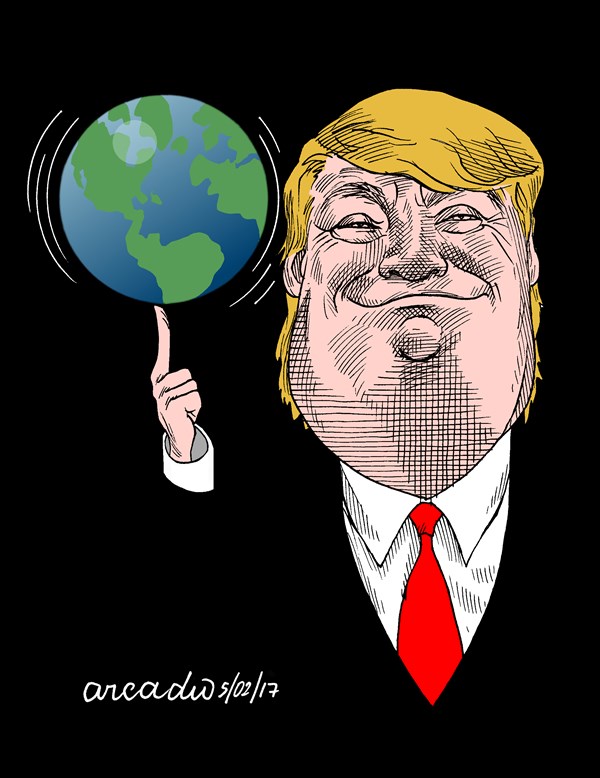
President Donald Trump is a man on a mission. And he's also in a hurry.
It wouldn't be an exaggeration to call his first week in the Oval Office one of the most dizzying in recent memory. The 45th-turned-47th president wasted no time getting down to business, trekking to the White House within hours of his inauguration to sign a stack of executive orders that overhauled how the federal government works, declared a national emergency along the U.S.-Mexico border, authorized Immigration and Customs Enforcement to accelerate deportation operations in America's interior and declassified records pertaining to the John F. Kennedy assassination.
That's not all; Trump has also begun a reorganization of the federal workforce, dismissed about 160 officials on the National Security Council and, yes, changed the decor inside the Oval Office. Political analysts have referred to Trump's first week as "shock and awe."
In terms of foreign policy, however, there isn't much to talk about it yet. What we have is a lot of noise from Trump but not much in the way of actual policy. The only concrete move Trump has made thus far is an executive order suspending all U.S. foreign aid for 90 days (with limited exceptions) until the State Department conducts an assessment on which programs should be scrapped and which should continue.
Outside of that, Trump is still getting his priorities in order as he assembles his national security team, some of whom haven't been confirmed by the Senate yet. What he does seem to enjoy, though, is arguing with foreign leaders about every issue under the sun. He remains infatuated with acquiring Greenland, a Danish territory, and reportedly had a very tense phone call with Denmark's prime minister, Mette Frederiksen, when she insisted that the Arctic island wasn't for sale.
Trump is flirting with slapping 25% tariffs on all Canadian and Mexican products coming into the U.S. as a way to pressure them on issues that don't have anything to do with trade. He's railing at the Panamanian government for allegedly handing the Panama Canal over to China and for charging U.S. ships high fees.
Trump also got into a fight this past weekend with Colombian President Gustavo Petro, who refused to allow two U.S. military planes carrying deported Colombian migrants back into Colombia. Trump responded by threatening to enact 50% tariffs on all Colombian goods, placing a travel ban on Colombian government officials and slapping financial sanctions on the country (Petro eventually backed down.)
Trump is making his presence felt outside the Western Hemisphere as well. Ending the war in Ukraine is a top foreign policy priority for the new administration —Trump talked about it numerous times during the campaign — and the boss isn't shy about expressing his views.
Notwithstanding the conventional wisdom that Trump will simply hand Ukraine over to Russian President Vladimir Putin, the president has threatened to enact more sanctions and tariffs on the Russian economy if Putin doesn't come to the table to negotiate seriously. He is also needling Putin in the process, calling Russia a much weaker country due to the Russian strongman's decision to launch a war of choice against a smaller neighbor.
The Russian government expressed an openness to direct talks with Washington while at the same time rejecting all of the various peace schemes Trump's advisers have floated.
Then there's North Korea, the subject of Trump's biggest diplomatic initiative during his first term. We all know the story here: After a monthslong war of words, Trump decided to buck the advice of his national security advisers by reaching out to North Korean leader Kim Jong Un directly.
The result was a bevy of historic summitry, strolls in the garden, warm letters and Trump becoming the first U.S. president to step foot on North Korean soil. While critics panned the summits as a waste of diplomatic resources, Kim ordered a moratorium on missile tests, no small achievement given the importance of the missile program to Pyongyang's security strategy. In the end, however, the U.S. and North Korea couldn't come to terms on the latter's nuclear program.
This isn't stopping Trump. He clearly wants to pick up where he left off. Asked during a Fox News interview last week whether he would reach out to North Korea again, Trump said yes. Referring to Kim, Trump called him "a smart guy" and mentioned how the two got along. Trump is betting he can use his force of personality, deal-making prowess and the personal relationship he developed with Kim to convince North Korea to denuclearize — a goal every U.S. administration over the last two decades failed to accomplish.
Can Trump do what others couldn't? The president obviously thinks he can, but the odds are stacked against him. North Korea's nuclear and missile programs have made strides in both numbers and capability since he was last in the White House, and the Kim regime is as committed to preserving its nuclear deterrent today as it was back then.
I'm not naive: No president will have all their policy ducks in a row during the first week. In fact, there's a good argument to be made that no president should have his or her policies set in stone at this stage of a presidency. The senior officials and worker bees in the vast U.S. foreign policy apparatus need an opportunity to assess the state of the world and determine what is and isn't feasible before funds and energy are expended on a way forward.
Even so, big decisions will eventually need to be made. Until then, we will be swimming in the choppy seas of speculation.
Previously:• 01/23/25 Let's not overreact to Gaza ceasefire
• 01/21/25 Are Trump's peace dreams for Ukraine mission impossible?
• 12/31/24 How will Syria evolve under new leadership?
• 11/14/24 How will Trump handle the war in Ukraine?
• 11/04/24 Is there really an 'axis of evil' set on destroying the US?
• 11/30/23 What will happen after the Israel-Hamas truce expires?
• 11/09/23 Pessimism is growing in Ukraine. Has the war with Russia reached a stalemate?
• 10/26/23 Biden's geopolitical equivalent of a high-wire act --- and success is by no means assured
• 10/12/23 How will the Israel-Hamas conflict affect US policy?
• 10/05/23 As the war in Ukraine grinds on, Europe will prove more crucial
• 09/18/23 The US and Vietnam should boost their relationship. China looms large
• 08/24/23 Zelensky's shiny, new toys and yet --- racking-up losses
• 08/17/23 The US is negotiating with Iran to release prisoners. Here's why that matters
• 08/03/23 What should the US do to normalize ties between Israel and Saudi Arabia?
• 06/09/23 Do we face nuclear confrontation? The erosion of agreements has heightened the risk
• 06/01/23 Why is the Defense Department immune from budget cuts?
• 05/18/23 Policy is at a crossroads in a deeply troubled Afghanistan
• 05/12/23 The US war on terror continues. We just don't talk about it
• 05/05/23 The US and world were naive about Sudan leaders' commitment to democracy
• 03/20/23 China gets the credit for improving Iran-Saudi Arabia ties --- but the US benefits
• 02/23/23 The first year of war in Ukraine has defied predictions
• 02/07/23 How does the US-China relationship continue after the spy balloon saga?
• 12/29/22 Why does the US defense budget continue to grow? America's approach needs rethinking
• 12/22/22 Ever so slowly, the nations are realigning
• 12/22/22 China is pushing a pacifist Japan into building up its military capabilities
• 12/09/22 Mideast country is putting US in a tough spot by threatening another Syria incursion
• 10/13/22 Don't underestimate the durability of autocracies
• 09/22/22 Is there still hope for a new Iran nuclear deal?
(COMMENT, BELOW)
Daniel DePetris
Chicago Tribune/(TNS)
Daniel R. DePetris is a fellow at Defense Priorities, a foreign policy think tank based in Washington, D.C., and a syndicated foreign affairs columnist for the Chicago Tribune.


 Contact The Editor
Contact The Editor
 Articles By This Author
Articles By This Author